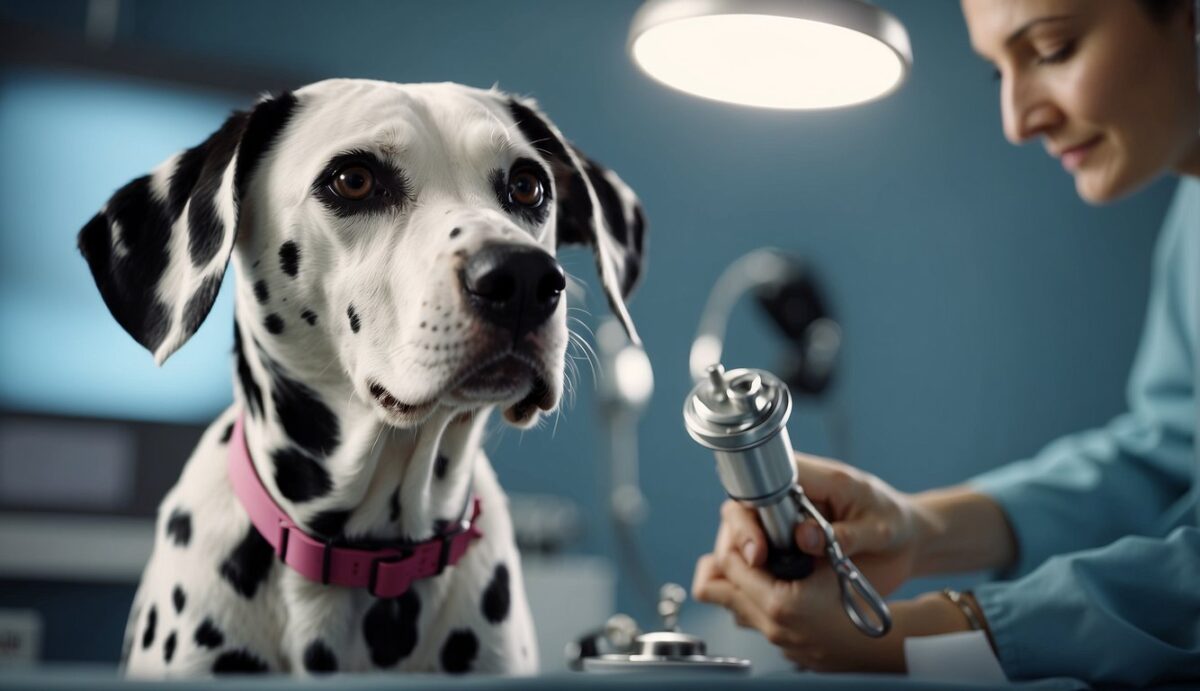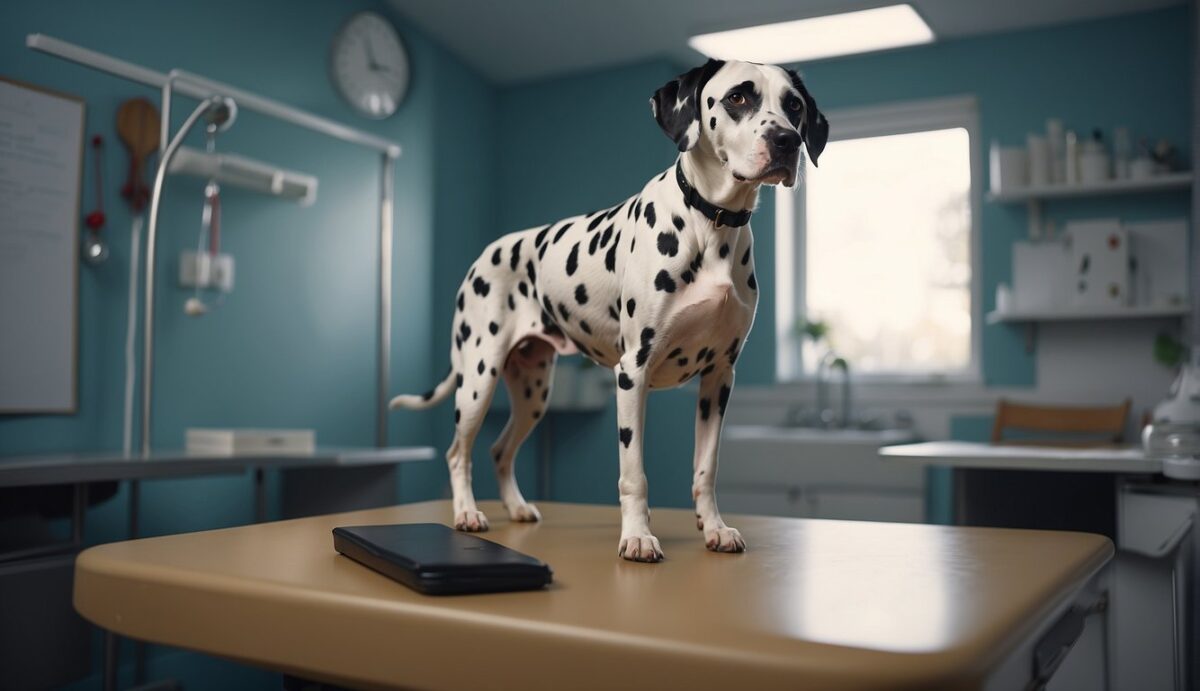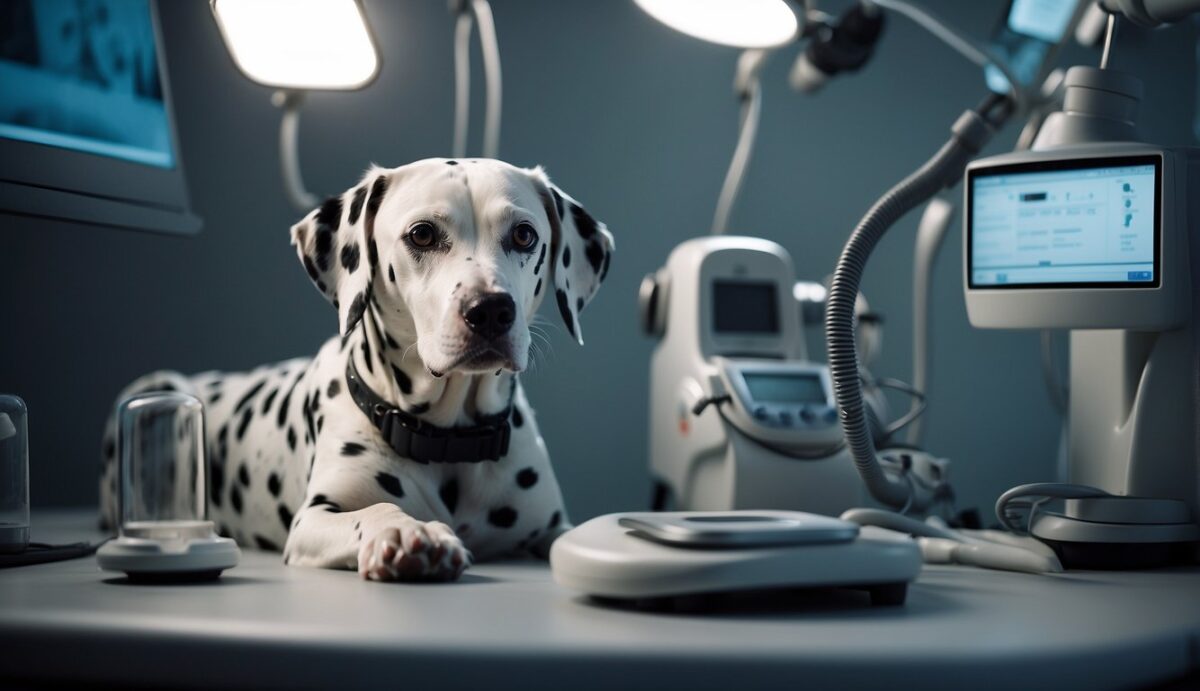Dalmatians, recognized by their distinctive spotted coats, are not only beloved as active and friendly companions but also notorious for certain heritable health conditions. Among these are neurological disorders that may affect their quality of life.
Neurological disorders in Dalmatians encompass a range of issues, from those affecting coordination and balance to more severe conditions like heritable progressive neurologic disorders. Awareness of the signs of neurological distress can lead to earlier diagnosis and treatment.

Diagnosing neurological disorders in Dalmatians often requires a comprehensive approach, considering both clinical observations and genetic factors. Veterinarians may employ a variety of diagnostic procedures, from physical examinations to advanced imaging like MRI.
Understanding the dog’s genetic history is also crucial, as some conditions are hereditary. Treatment strategies vary widely depending on the disorder, but they may include medication, physical therapy, or in some cases, surgery. Scientific advances continue to provide new insights into canine neurology, improving outcomes for affected dogs.
Key Takeaways
- Recognizing the signs of neurological issues can aid in early diagnosis for Dalmatians.
- Genetic factors are important in diagnosing and understanding these disorders.
- Treatment options vary and include medications, therapy, and potentially surgery.
Identifying Neurological Disorders in Dalmatians

When your Dalmatian begins to show unusual signs, it is essential to understand what can signal a neurological disorder. This section will guide you through common symptoms, behavioral changes, and methods for assessing your pet’s neurological health.
Common Symptoms and Signs
Your Dalmatian might exhibit various symptoms that can indicate a neurological issue. Be on the lookout for:
- Seizures: Sudden, uncontrolled electrical disturbances in the brain that can lead to changes in behavior, movements, feelings, and levels of consciousness.
- Tremors: Involuntary, rhythmic muscle contractions and relaxations, often resulting in trembling limbs.
- Paralysis or Weakness: Difficulty standing up, limping, or complete loss of muscle function in one or more limbs can be a sign of serious nerve or muscle issues.
- Balance and Gait Issues: Watch for signs of loss of balance, uncoordinated movements, or an abnormal gait, as these can indicate a problem with the nervous system.
Behavioral and Cognitive Changes
Neurological disorders may also cause changes in your Dalmatian’s behavior and mental state, including:
- Anxiety or Agitation: Unexplained changes in behavior such as restlessness or increased sensitivity.
- Cognitive Decline: Confusion, decreased problem-solving abilities, or difficulty learning new tasks.
- Sleep Disturbances: Shifts in sleep patterns could be related to neurological or mental disorders.
Assessing Physical and Sensory Capabilities
A detailed assessment of your Dalmatian’s physical and sensory capabilities can lead to a diagnosis. This includes:
- Physical Exam: A veterinarian will check your Dalmatian’s muscles and nerves for signs of weakness, stiffness, or abnormal movements.
- Peripheral Nerve and Sensation Check: Examining the response to stimuli to assess nerve function and sensation level.
- Vision Tests: Ensuring awareness and responsiveness to visual cues can rule out or confirm neurological impairments.
Diagnostic Procedures for Dalmatians

When your Dalmatian shows signs of a neurological disorder, specific diagnostic tests are crucial to understand the issue and plan appropriate treatment. Your specialist will likely recommend a combination of advanced imaging techniques, electrodiagnostic testing, and laboratory exams.
Imaging Techniques
For accurate diagnosis, Magnetic Resonance Imaging (MRI) is commonly used to view the brain and spinal cord. This technique is vital in detecting white matter abnormalities, brain tumors, or signs of inflammation. An MRI can provide detailed images that help a neurologist pinpoint the location and extent of neurological damage.
Your dog might also undergo a CT scan, which is faster but less detailed than an MRI, to rapidly assess situations where time is critical, such as acute trauma.
Electrodiagnostic Testing
Electrodiagnostic testing involves procedures like electromyography (EMG), which measures the electrical activity of muscles. The EMG can be essential to distinguish between muscle and nerve disorders. This test can reveal problems with nerves sending signals to muscles, indicating peripheral nerve disorders.
Laboratory Tests and Fluid Analysis
To further diagnose neurological conditions, a specialist may perform blood tests to look for signs of infections, inflammation, or other underlying conditions. Another critical diagnostic tool is the analysis of cerebrospinal fluid, which can detect changes in the immune response within the brain and spinal cord. DNA testing may also be conducted, especially in the context of hereditary diseases, as is often seen in Dalmatians with specific neurological conditions discovered through clinical trials.
Understanding Genetic Factors

When considering neurological disorders in Dalmatians, it’s crucial to be aware of the genetic influences that may impact their health. The role of genetics can be complex, but understanding these factors is essential for early diagnosis and treatment.
Inherited Neurological Disorders
Inherited neurological disorders in Dalmatians are due to mutations in specific genes that they pass from one generation to the next. An example of an autosomal recessive disorder is a lysosomal storage disease, which can manifest in puppies and older dogs. Diagnosis usually involves genetic testing to identify the mutated gene responsible for the condition. When both parents carry the mutated gene, there’s a 25% chance with each pregnancy that the puppies will have the disorder.
Breed-Specific Predispositions
Dalmatians have unique genetic predispositions, contributing to breed-specific neurological issues. Your attention to the DNA and familial history of your Dalmatian can guide you in understanding the risk of these disorders.
For instance, deafness is a condition found in Dalmatian puppies and has a genetic component. Early diagnosis and intervention can improve the quality of life, and genetic testing for certain markers can help determine susceptibility.
Comprehensive Neurological Disorders in Dalmatians

In this section, you’ll learn about neurological disorders that can affect Dalmatians, focusing on how they impact both the central and peripheral nervous systems. You’ll discover specific disorders that entail a range of symptoms from gait abnormalities to seizures.
Central and Peripheral Nervous System Disorders
Dalmatians, like other breeds, can be affected by issues within their central and peripheral nervous systems. The central nervous system (CNS), composed of the brain and spinal cord, can be afflicted with congenital disorders like hydrocephalus, where fluid accumulates in the brain, or cerebellar hypoplasia, leading to underdeveloped brain structures affecting balance and coordination.
Meanwhile, conditions such as laryngeal paralysis and other neuropathies, where the peripheral nervous system (PNS) is compromised, can lead to dysfunction in transmitting signals to the muscles and organs from the brain.
Degenerative conditions like wobbler syndrome can also manifest in coordination problems. This syndrome is particularly concerning because it affects the spine in the neck region, potentially causing compression of the spinal cord and thus leading to difficulty in gait.
Myelopathy, a broad term for spinal cord diseases, might present with similar symptoms of gait and coordination issues. In Dalmatians, recognizing these signs early on can aid in a more proactive approach to management and treatment.
Specific Types of Canine Neurological Disorders
In the realm of canine neurological disorders specific to Dalmatians, vestibular disease can lead to disorientation or a tremor. This is commonly noticed as a head tilt or difficulty balancing.
Cerebellar abiotrophies are degenerative diseases leading to loss of coordination, often evident in awkward movements or a high-stepping gait called ataxia.
Moreover, hereditary disorders like congenital vestibular disease are seen in some bloodlines and cause significant balance and coordination issues from birth.
Unfortunately, epilepsy is another hereditary concern, causing seizures that can range from mild to severe.
Less commonly, inflammation resulting from infections like encephalitis or conditions such as hepatic encephalopathy, where liver dysfunction allows toxins to affect the brain, can also be seen.
Tumors and strokes are rarer but should be considered when sudden neurological changes occur.
Meanwhile, atlantoaxial subluxation, where a dislocation between the first two cervical vertebrae occurs, can cause immediate neurological dysfunction and requires urgent veterinary attention.
| Disorder | CNS/PNS Affected | Common Signs |
|---|---|---|
| Hydrocephalus | CNS | Enlarged head, seizures |
| Cerebellar Hypoplasia | CNS | Poor coordination, unsteady gait |
| Laryngeal Paralysis | PNS | Change in bark, breathing difficulty |
| Wobbler Syndrome | CNS | Weakness, wobbly gait |
| Myelopathy | CNS | Weakness, incoordination |
| Vestibular Disease | CNS | Head tilt, balance loss |
| Cerebellar Abiotrophies | CNS | Ataxia, intention tremors |
| Congenital Vestibular Disease | CNS | Head tilting, circling |
| Epilepsy | CNS | Recurrent seizures |
| Encephalitis | CNS | Fever, seizures, lethargy |
| Hepatic Encephalopathy | CNS | Disorientation, behavior changes |
| Atlantoaxial Subluxation | CNS | Acute pain, paralysis |
| Tumors/Stroke | CNS | Sudden neurological deficits |
Treatment Strategies for Dalmatian Neurological Disorders

When your Dalmatian faces neurological disorders, various treatment strategies encompass medication, surgery, and rehabilitation to manage symptoms and improve life quality. Let’s explore each treatment option to better understand how they can help your pet.
Medication and Drug Therapy
Your Dalmatian may require specific medications to control seizures, manage pain, and alleviate inflammation.
Antiepileptic drugs are commonly prescribed to control seizure activity, which is crucial for protecting the brain and preventing further complications.
Pain relievers and anti-inflammatory drugs can help address the discomfort associated with neurological disorders, allowing your dog to maintain a more comfortable and active lifestyle.
- Antiepileptic drugs: Phenobarbital, Levetiracetam
- Pain management: NSAIDs, Gabapentin
- Anti-inflammatory: Prednisone (steroids)
Surgery and Invasive Procedures
Surgical options are considered when there’s a clear structural issue affecting the spinal cord or brain, like a tumor or herniated disc.
Procedures may vary from minimally invasive ones to more complex surgeries, depending on the severity of the condition.
The goal of surgery is twofold: to remove any causative problems when possible and to prevent further neurological decline.
- Decompressive surgery: For conditions like Intervertebral Disc Disease (IVDD)
- Tumor removal: If a cancerous growth is impairing neurological function
Rehabilitation and Physical Therapy
Physical therapy is vital for your Dalmatian’s recovery, especially if they’re experiencing muscle weakness or problems with balance and coordination.
A tailored physical therapy program can enhance mobility and strength while incorporating activities to help with cognitive decline. The prognosis often improves with consistent and specialized rehab efforts.
- Exercises: Balance boards, treadmill therapy, swimming
- Cognitive games: To assist with mental sharpness and neuroplasticity
- Muscle strengthening: Targeted activities to bolster weak muscles
Prognosis and Management

When managing Dalmatian neurological disorders, your focus will predominantly be on maintaining your pet’s quality of life and managing symptoms through a structured care plan. The long-term outlook will largely depend on the specific disorder and the efficacy of the treatments.
Long-Term Outlook and Life Quality
The long-term prognosis for Dalmatians with neurological disorders varies. Some conditions may lead to progressive cognitive decline, while others have a static course or might even improve over time with appropriate management. Your veterinarian will be key in determining the likely course of your dog’s condition.
Treatment options often include:
- Medication: To manage symptoms such as seizures or anxiety.
- Physical Therapy: To improve mobility and function if your dog experiences muscle weakness or paralysis.
- Routine Monitoring: Regular check-ups help adapt the treatment plan as needed.
Maintaining a high quality of life is also crucial. Adjustments to daily routines and the home environment can help:
- Exercise: Tailor exercises to your dog’s abilities to help maintain their physical and mental health.
- Diet: A balanced diet can support overall health and assist with the management of some neurological symptoms.
Supportive Care and Accommodations
Caring for a Dalmatian with a neurological disorder will likely require changes to your home and routine to better support their needs:
- Home Adjustments: Non-slip rugs and ramps can help a dog with mobility issues navigate the home more easily.
- Routine: Establishing a consistent routine can reduce anxiety and help with cognitive issues.
- Comfort: Ensuring a comfortable resting area can help alleviate pain and stress.
Advances in Neurology for Canine Health

Recent years have seen a push towards understanding and treating neurological disorders in dogs, like Dalmatians, giving you new hope for managing these conditions effectively.
Clinical Trials and Research
Thinking about gene identification and its role in your dog’s health has become a foundational aspect of veterinary neurology.
Notably, researchers are now able to pinpoint genes associated with hereditary neurological disorders. For instance, a research team found a novel neurologic disorder in Dalmatians, indicating a potential genetic basis that can aid in diagnosis and treatment.
Clinical trials have become the bridge between research and real-world therapy.
Institutions like the National Institute of Neurological Disorders and Stroke are components of a larger network funding these pivotal studies.
They strive for innovation in both diagnosis and treatment, often focusing on translating laboratory findings into new therapies.
Emerging Therapies and Treatments
When your Dalmatian is diagnosed with a neurological disorder, knowing the available treatments and therapies is key.
Recent research has led to emerging therapies, including medical management with drugs that protect nerve cells or enhance nerve conduction.
Advanced treatment options might involve innovative surgical techniques developed to address specific neurological conditions. These procedures aim to alleviate symptoms and, in some cases, offer the chance of recovery dependent on timely intervention.
The field of veterinary neurology constantly adapts, integrating the latest innovations from ongoing research. As a pet owner, staying informed about these advances ensures you’re providing the best possible care for your furry friend.
Frequently Asked Questions
Navigating through neurological issues in Dalmatians can be challenging. This section aims to answer common questions regarding signs, diagnosis, and treatment of neurological disorders in these dogs.
What are the symptoms of neurological issues in Dalmatians?
Your Dalmatian may show various neurological symptoms such as loss of coordination, muscle weakness, unexplained tremors, or seizures. These signs could indicate an underlying neurological condition that warrants further investigation by a veterinarian.
How is degenerative myelopathy identified and managed in dogs?
Degenerative myelopathy is diagnosed through a combination of clinical signs, genetic testing for specific mutations, and ruling out other conditions.
Management involves supportive care, physical therapy, and in some cases, the use of assistive devices to maintain mobility.
What treatment options are available for dogs showing neurological signs?
Treatment options for neurological signs in dogs depend on the cause.
They can range from medications such as anti-inflammatories and pain relievers to surgery for conditions like intervertebral disc disease. Supportive care, including physical therapy, may also be recommended.
What is the most prevalent neurological condition affecting dogs?
The most prevalent neurological condition in dogs is epilepsy, which leads to recurrent seizures. While it can be inherited, epilepsy can also develop due to other underlying conditions.
How do veterinarians diagnose neurological issues in canines?
Veterinarians typically start with a thorough medical history and physical examination. This includes a neurological exam. After that, they do diagnostic tests such as blood work and imaging (like MRI or CT scan). Sometimes, they also do cerebrospinal fluid analysis to pinpoint the neurological issue.
What steps should I take if my Dalmatian starts exhibiting signs of a neurological disorder?
If your Dalmatian starts showing signs of a neurological disorder, promptly consult with a veterinarian to get a proper diagnosis. Early intervention and a tailored treatment plan are critical for managing neurological diseases effectively.

